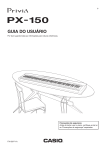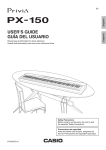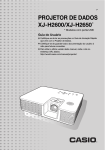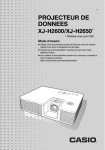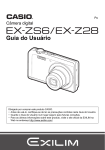Download Casio Clock MA1205-EA User's Manual
Transcript
MA1205-EA © 2012 CASIO COMPUTER CO., LTD. Operation Guide DQ-950S ILLUSTRATION 1 2 3 SNOOZE/LIGHT RESET MAX/MIN MAX/MIN 4 SET DEMO 8 SNO OZE /LIG HT ALARM SNOOZE ON 5 OFF 6 7 SET ALARM SNOOZE DEMO ON OFF RESET RESET • A sticker is affixed to the glass of the clock when you purchase it. Be sure to remove the sticker before using the clock. • Depending on the clock model, the configuration of your clock may differ somewhat from that shown in the illustration. Alarm Off Snooze Alarm On PM indicator Alarm on indicator Snooze on indicator Current time (Hour, minutes, seconds) Day of the week DATE (month - date) Current Temperature Alarm time Current Humidity 1 Operation Guide DQ-950S GENERAL GUIDE USING THE CLOCK 1 SNOOZE/LIGHT button • Press this button to illuminate the display for about five seconds. • The SNOOZE/LIGHT button is the area at the top of the clock panel marked “SNOOZE/LIGHT”. • Pressing this button while the alarm is sounding stops the alarm. 1. Press the SET button (5) to cycle through the setting screens as shown below. Normal Timekeeping Screen Contrast Setting Screen Year Setting Screen 12-hour/24-hour Setting Screen Month and Day Setting Screen Time Setting Screen 2 MAX/MIN button Press this button to display the high and low temperature and humidity values. 3 °C/°F button Press this button to toggle the temperature units between Celsius and Fahrenheit. 4 + (UP) / – (DOWN) buttons Use these buttons to change the alarm time or the setting that is flashing on the display. 5 SET button Use this button when setting the current time. 6 DEMO button Press this button to test the alarm sound. 7 RESET button Press this button to reset the clock after replacing its batteries. 8 Alarm Mode selector SNOOZE: Snooze alarm on ON: Alarm on OFF: Alarm off 2. While the screen you want is displayed, use the – (DOWN) and + (UP) buttons (4) to change the flashing digits. MAX/MIN Press – (DOWN) to decrease the flashing digits. Press + (UP) to increase the flashing digits. • Holding down + (UP) or – (DOWN) changes the flashing digits at high speed. • You can set the year in the range of 2000 to 2099. The day of the week is set automatically in accordance with the date setting. • Pressing + (UP) or – (DOWN) while the Time Setting Screen is on the display causes the seconds count to be reset to 00. • Each press of + (UP) or – (DOWN) while the 12-hour/24-hour Setting Screen is on the display toggles between 12-hour and 24-hour timekeeping. • You can set the contrast level in the range of 1 to 10. 3. After making the settings you want, use the SET button (5) to display the Normal Timekeeping Screen. • The clock automatically returns to the Normal Timekeeping Screen if you leave a setting screen on the display for about three minutes without performing any operation. 2 Operation Guide DQ-950S USING THE ALARM THERMOMETER AND HYGROMETER FUNCTIONS The alarm sounds when the alarm time you set is reached. You can also use the Alarm Mode selector (8) to select the snooze alarm feature. A built-in sensor measures temperature and humidity, and shows the measured value on the display. The readout from the temperature sensor can also be switched between Celsius (°C) and Fahrenheit (°F). Setting the Alarm Time Temperature Measurements Use the – (DOWN) and + (UP) buttons (4) to set the alarm time. Pressing the – (DOWN) and + (UP) buttons (4) causes the alarm time to appear in place of the date on the display. • The temperature display shows “LO” for temperatures below –19.9°C (–3.8°F) and “HI” for temperatures above 49.9°C (121.8°F). • Though temperature readings are displayed up to 0°C (32°F) and greater than 41°C (105°F), note that such readings are actually outside the guaranteed temperature range of this clock. Switching between Celsius and Fahrenheit MAX/MIN Press to change the alarm time setting (—). Press to change the alarm time setting (+). • Push the °C/°F button (3) to select either Celsius (°C) or Fahrenheit (°F). • Switching between Celsius and Fahrenheit causes current high temperature/humidity and low temperature/ humidity memory contents to be cleared. Celsius (°C) Fahrenheit (°F) • Holding down + (UP) or – (DOWN) changes the digits at high speed. °C/°F button (3) Turning the Alarm On and Off Use the Alarm Mode selector (8) on the side of the clock to turn the alarm on and off, and to select the snooze feature. Description Alarm Mode selector SNOOZE The alarm sounds at the preset time for one minute, and seven more times every five minutes thereafter. Even if you stop the alarm by pressing the SNOOZE/LIGHT button (1), the alarm sounds again about five minutes later. flashes on the display to indicate that the snooze feature is • The indicator activated. ON The alarm sounds at the preset time for one minute. °F °C Humidity Measurements • The humidity display shows “LO” for humidity below 10% and “HI” for humidity above 90%. • Whenever the current temperature is outside the range of 0°C to 49.9°C, the humidity display will show “– –”. Daily High Temperature/Humidity, Low Temperature/Humidity Memory • The clock remembers the highest and lowest temperature and humidity readings for the current 24-hour day. Each press of the MAX/MIN button (2) cycles between screens as illustrated below. • Daily high and low temperature/humidity memory contents are cleared each day at midnight. Changing the Temperature/Humidity Display Screen • Press of the MAX/MIN button (2). Each press cycles between screens as shown below. OFF The alarm does not sound. • The alarm time appears in place of the date on the display whenever the Alarm Mode selector (8) is set to ON or SNOOZE. • The volume of the alarm sound cycles through five levels as it sounds. Current temperature and humidity MAX/MIN button (2) MAX/MIN button (2) Stopping the Alarm • When alarm is sounding, press the SNOOZE/LIGHT button (1) to stop it. When the snooze feature is turned on, the alarm will sound again in about five minutes. • To turn off the snooze feature, slide the Alarm Mode selector (8) to OFF. High temperature and humidity Low temperature and humidity MAX/MIN button (2) USING THE LIGHT Pressing the SNOOZE/LIGHT button (1) turns on the light and illuminates the display for easy reading in the dark. Important! • Overuse of the light can shorten battery life. Turning On Temperature/Humidity Screen Auto Cycling • Hold down the MAX/MIN button (2) for about one second. This will turn on temperature/humidity screen auto cycling, which causes the screen contents to cycle from one screen to the next at regular intervals. Current temperature and humidity High temperature and humidity Low temperature and humidity • To turn off temperature/humidity screen auto cycling, press the MAX/MIN button (2). 3 Operation Guide DQ-950S BATTERY REPLACEMENT Replace batteries whenever the display of the clock becomes dim and difficult to read. 1. Open the battery compartment cover as shown in the illustration. 2. Remove all of the old batteries. 3. Load a full set of new batteries. Make sure that their positive (+) and negative (–) ends face in the correct directions. If you load batteries incorrectly, they can burst and damage the clock. 4. Press the RESET button (7). Be sure to press the RESET button (7) after replacing batteries. 5. Replace the battery compartment cover. Battery precautions • Keep batteries out of the reach of small children. If a battery is accidentally swallowed, contact your physician immediately. • Be sure to load the batteries with their positive (+) and negative (–) ends facing correctly. • Never mix old and new batteries, or batteries of different brands. • Never charge the batteries that come with the clock. • Should batteries ever leak while in the clock, wipe out the fluid with a cloth, taking care not to let any get onto your skin. • Replace the batteries at least once a year, even if the current batteries are working properly. • The batteries that come with the clock lose some of their power during transport and storage. SPECIFICATIONS Accuracy at Normal Temperature: ±60 seconds a month Calendar System: Auto-calendar pre-programmed from the year 2000 to 2099 Alarm: Daily Alarm, Snooze Alarm (7 repeats) Thermometer Functions: Measuring range: –19.9°C to 49.9°C (–3.8°F to 121.8°F) Though temperature readings are displayed up to 0°C (32°F) and greater than 41°C (105°F), note that such readings are actually outside the guaranteed temperature range of this clock. High/Low Temperature Memory, Celsius (°C)/Fahrenheit (°F) switching Temperature Sensor Precision: ±2°C (±4°F) in range of 0°C to 40°C (32°F to 104°F) Hygrometer Function: Measuring range: 10% to 90%, when temperature is 0°C to 40°C (32°F to 104°F) High/Low Humidity Memory Humidity Sensor Precision: ±10%, when temperature is 5°C to 40°C (41°F to 104°F) Other: LED light; 12/24-hour timekeeping Battery: Two AAA size batteries (Type: R03) Battery Life: Approximately 1 year • 1 minute alarm operation per day • 5 seconds light operation per day Operating Temperature: 0°C to 40°C (32°F to 104°F) 4




